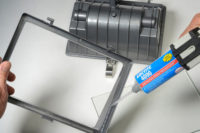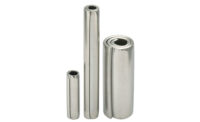In numerous industries and applications, high-performing structural adhesives are replacing standard joining methods such as welding and the use of mechanical fasteners like rivets and bolts.
Performance and economic drivers are compelling customers to abandon these more costly solutions and opt for the less expensive and more advantageous option. It’s time to say good-bye to archaic joining processes and say hello to the new line of high-performing structural adhesives.
Advantages of Structural Adhesives
Structural adhesives are cost effective and will help cut manufacturing costs by reducing the number of mechanical fasteners, spot welds and filler metal required to create a joint or attach two substrates.
In the manufacturing process, adhesives are generally hidden between two substrates, which can offer aesthetic improvements over welding and mechanical fasteners. Plus, an adhesive bonded joint results in a smooth, clean surface, which requires minimal surface preparation prior to final finishing. Therefore, manufacturers can eliminate labor-intensive finishing costs such as sanding off slag from spot welding.
A huge advantage to advanced product design is that adhesives can be pre-applied to parts otherwise inaccessible to mechanical fastening or welding during the assembly process. This revelation enables engineers not to be bound in their innovation of design by previous obstacles of space and accessibility. An additional benefit is the reduction in the amount of time it takes to join substrates. Welding or installing mechanical fasteners generally is much more time consuming compared to using an adhesive.
Structural adhesives excel in joining dissimilar substrates and materials with different thicknesses. The adhesive compensates for differences in the expansions and contractions of dissimilar materials. High-performance structural adhesives can form resilient bonds and maintain its strength over a wide range of temperatures too.
Adhesives have the ability to eliminate the stress concentration caused by spot welds, rivers, screws, and other mechanical fasteners while maintaining surface integrity. Whereas a rivet or screw hole in a substrate concentrates the stress at the hole, which can potentially decrease the physical properties of the substrate, adhesives spread the load over the entire bonded area.
Using structural adhesives can reduce the weight of the finished product or structure because less welding metals and mechanical fasteners are used. Additionally, eliminating screw holes and rivets in assembly processes enables manufacturers to utilize thinner, lighter materials without concerns of distortion, splitting, or crazing at the mechanically fastened site. An added benefit of eliminating the holes in metal is that it can also reduce the chance for rust and corrosion.
Unlike welding, structural adhesives have the ability to maintain the integrity of the bonded materials because there is no metal distortion or weakening due to heat when using adhesives.
Structural adhesives can also increase the stiffness of structures and provide the necessary fatigue and force resistance.
Who’s Using Structural Adhesives?
In a word, everyone. New applications are being developed and tested daily.
Reports from the agricultural industry show workers are repairing metal fences using structural adhesives instead of welding.
Marine industry manufacturers are bonding parts using structural adhesives in applications that require high resistance to chemicals like kerosene, hydrocarbon oil, mineral spirits, and ethylene glycol.
The automotive industry is moving away from rivets in favor of structural adhesives due to a combination of corrosion resistance, stress relief and cost reduction.
Aerospace engineers were among the earliest industries to adopt structural adhesives, mainly because adhesives can create seals that keep water out of metal fabrications while providing corrosion protection.
For more information on high performance structural adhesives specifically for your product assembly application, visit http://hernon.com or contact HERNON Manufacturing directly at 800-527-0004.




